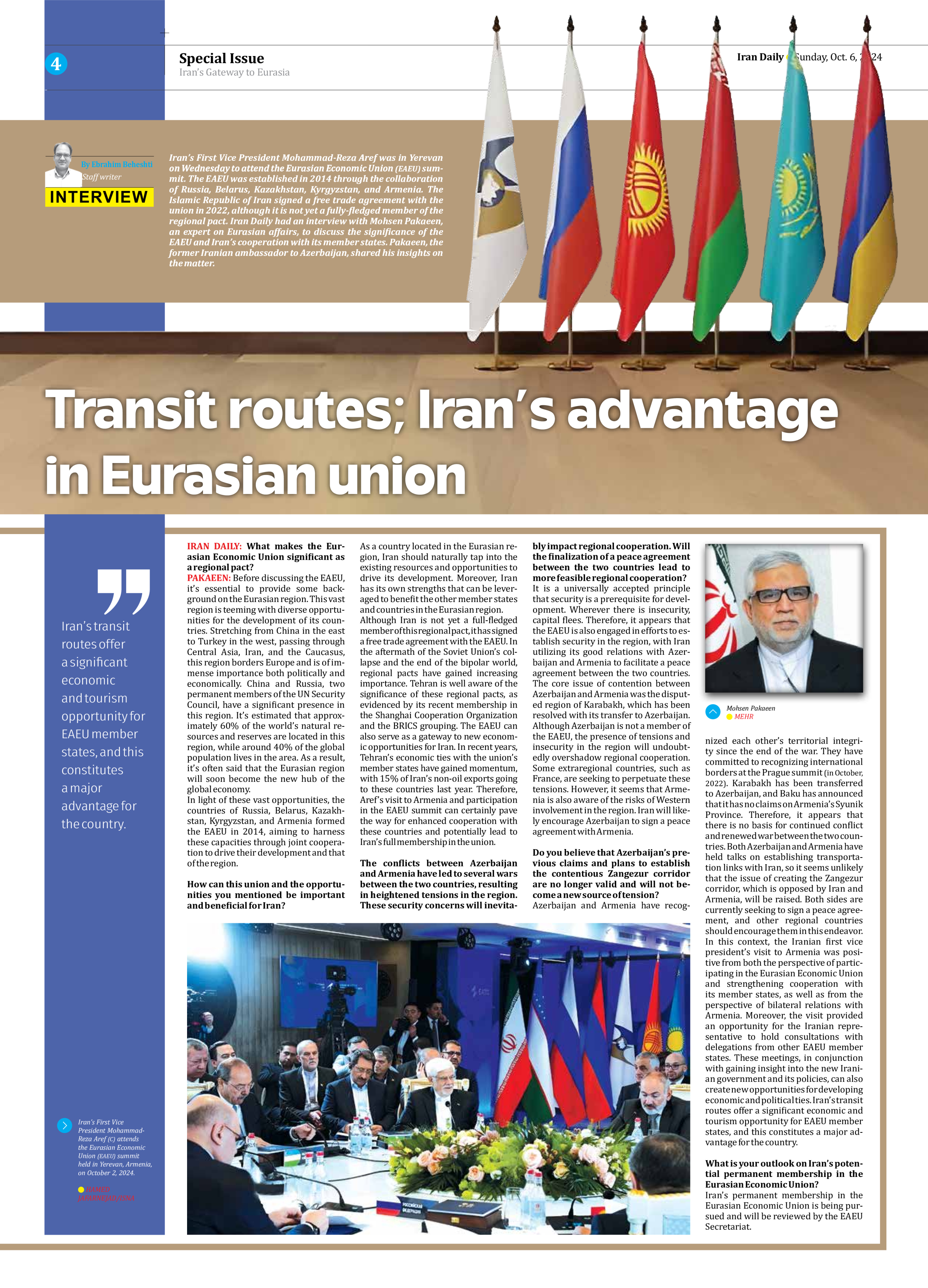
Transit routes; Iran’s advantage in Eurasian union
Iran’s First Vice President Mohammad-Reza Aref was in Yerevan on Wednesday to attend the Eurasian Economic Union (EAEU) summit. The EAEU was established in 2014 through the collaboration of Russia, Belarus, Kazakhstan, Kyrgyzstan, and Armenia. The Islamic Republic of Iran signed a free trade agreement with the union in 2022, although it is not yet a fully-fledged member of the regional pact. Iran Daily had an interview with Mohsen Pakaeen, an expert on Eurasian affairs, to discuss the significance of the EAEU and Iran’s cooperation with its member states. Pakaeen, the former Iranian ambassador to Azerbaijan, shared his insights on the matter.
By Ebrahim Beheshti
Staff writer
IRAN DAILY: What makes the Eurasian Economic Union significant as a regional pact?
PAKAEEN: Before discussing the EAEU, it’s essential to provide some background on the Eurasian region. This vast region is teeming with diverse opportunities for the development of its countries. Stretching from China in the east to Turkey in the west, passing through Central Asia, Iran, and the Caucasus, this region borders Europe and is of immense importance both politically and economically. China and Russia, two permanent members of the UN Security Council, have a significant presence in this region. It’s estimated that approximately 60% of the world’s natural resources and reserves are located in this region, while around 40% of the global population lives in the area. As a result, it’s often said that the Eurasian region will soon become the new hub of the global economy.
In light of these vast opportunities, the countries of Russia, Belarus, Kazakhstan, Kyrgyzstan, and Armenia formed the EAEU in 2014, aiming to harness these capacities through joint cooperation to drive their development and that of the region.
How can this union and the opportunities you mentioned be important and beneficial for Iran?
As a country located in the Eurasian region, Iran should naturally tap into the existing resources and opportunities to drive its development. Moreover, Iran has its own strengths that can be leveraged to benefit the other member states and countries in the Eurasian region.
Although Iran is not yet a full-fledged member of this regional pact, it has signed a free trade agreement with the EAEU. In the aftermath of the Soviet Union’s collapse and the end of the bipolar world, regional pacts have gained increasing importance. Tehran is well aware of the significance of these regional pacts, as evidenced by its recent membership in the Shanghai Cooperation Organization and the BRICS grouping. The EAEU can also serve as a gateway to new economic opportunities for Iran. In recent years, Tehran’s economic ties with the union’s member states have gained momentum, with 15% of Iran’s non-oil exports going to these countries last year. Therefore, Aref’s visit to Armenia and participation in the EAEU summit can certainly pave the way for enhanced cooperation with these countries and potentially lead to Iran’s full membership in the union.
The conflicts between Azerbaijan and Armenia have led to several wars between the two countries, resulting in heightened tensions in the region. These security concerns will inevitably impact regional cooperation. Will the finalization of a peace agreement between the two countries lead to more feasible regional cooperation?
It is a universally accepted principle that security is a prerequisite for development. Wherever there is insecurity, capital flees. Therefore, it appears that the EAEU is also engaged in efforts to establish security in the region, with Iran utilizing its good relations with Azerbaijan and Armenia to facilitate a peace agreement between the two countries. The core issue of contention between Azerbaijan and Armenia was the disputed region of Karabakh, which has been resolved with its transfer to Azerbaijan. Although Azerbaijan is not a member of the EAEU, the presence of tensions and insecurity in the region will undoubtedly overshadow regional cooperation. Some extraregional countries, such as France, are seeking to perpetuate these tensions. However, it seems that Armenia is also aware of the risks of Western involvement in the region. Iran will likely encourage Azerbaijan to sign a peace agreement with Armenia.
Do you believe that Azerbaijan’s previous claims and plans to establish the contentious Zangezur corridor are no longer valid and will not become a new source of tension?
Azerbaijan and Armenia have recognized each other’s territorial integrity since the end of the war. They have committed to recognizing international borders at the Prague summit (in October, 2022). Karabakh has been transferred to Azerbaijan, and Baku has announced that it has no claims on Armenia’s Syunik Province. Therefore, it appears that there is no basis for continued conflict and renewed war between the two countries. Both Azerbaijan and Armenia have held talks on establishing transportation links with Iran, so it seems unlikely that the issue of creating the Zangezur corridor, which is opposed by Iran and Armenia, will be raised. Both sides are currently seeking to sign a peace agreement, and other regional countries should encourage them in this endeavor.
In this context, the Iranian first vice president’s visit to Armenia was positive from both the perspective of participating in the Eurasian Economic Union and strengthening cooperation with its member states, as well as from the perspective of bilateral relations with Armenia. Moreover, the visit provided an opportunity for the Iranian representative to hold consultations with delegations from other EAEU member states. These meetings, in conjunction with gaining insight into the new Iranian government and its policies, can also create new opportunities for developing economic and political ties. Iran’s transit routes offer a significant economic and tourism opportunity for EAEU member states, and this constitutes a major advantage for the country.
What is your outlook on Iran’s potential permanent membership in the Eurasian Economic Union?
Iran’s permanent membership in the Eurasian Economic Union is being pursued and will be reviewed by the EAEU Secretariat.







